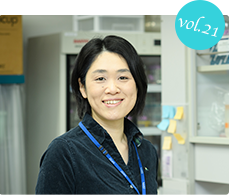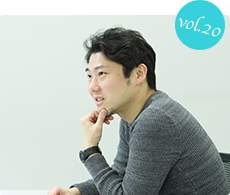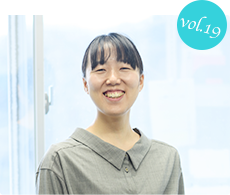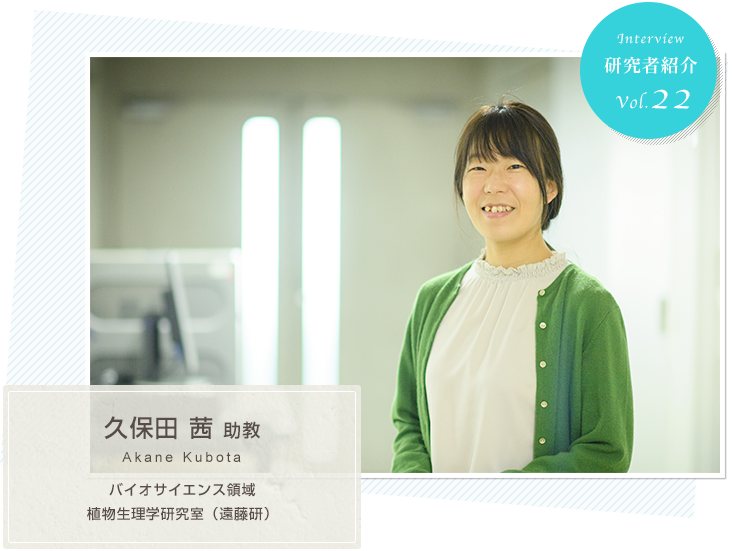
![]()
D., Graduate School of Life Sciences, Kyoto University, 2014. D. (Life Sciences). After working as a postdoctoral fellow at the University of Washington (USA), she has been in her current position since September 2018. She specializes in plant molecular biology and molecular genetics. She is currently working on the regulatory mechanisms of seasonal flowering.
Why did you become a researcher?
When I was in high school, I studied abroad for a year in a language program, and I had a vague idea that in the future I wanted to do a job that would give me the opportunity to work internationally. However, when I entered university, I was so busy playing that I forgot about such aspirations. In my third year, I happened to find the student laboratory for molecular biology experiments very interesting, so I applied to be assigned to the laboratory in charge of the experiments. My motivation for choosing plants as the subject of my experiments was also very simple and clear: I wanted to do molecular biology, but I was not good at animal experiments. I wanted to work with multicellular organisms rather than unicellular organisms. So I thought plants would be a good choice.
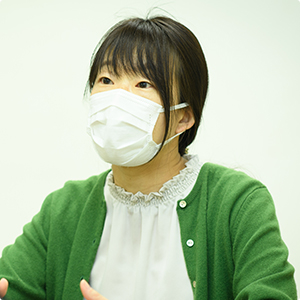
I thought about getting a job during the second year of the master's program, but the job search didn't go well, so I decided to go to the Ph.D. program for a year anyway, with a rather passive reason. However, at that time, one of my seniors in the lab gave me a pep talk and told me, "A Ph.D. is a professional problem solver. A Ph.D. program is a training ground for problem solving, not an increasingly narrow specialization," and I was determined to finish it.
Fortunately, at that time, I was surrounded by professors, seniors, classmates, and juniors who had excellent communication and behavioral skills and were all working hard on high-quality research, so I had no shortage of daily goals. I found myself thinking about finding a job, "I'm not going to stop until I'm recognized here!" I am truly grateful to my teachers, seniors, and friends for allowing me to spend my precious time in my twenties being beaten up by these top-notch researchers and running like crazy.
I am very grateful to my professors, seniors, and friends for their support and encouragement.
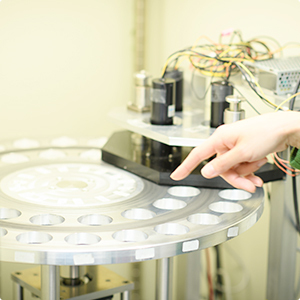
With a Ph.D. and a license as a "professional problem solver," I decided to develop my skills as a researcher and became a postdoctoral fellow without hesitation. Then I suddenly remembered that I wanted to work with a global perspective, so I decided to do a postdoctoral fellowship abroad. I contacted several labs that I had interacted with during my postdoc and was able to secure a position at the University of Washington in the US, where I stayed for four years.
In the U.S., visa types change after five years, and when my boss finally asked me where I wanted to work, I told him, "Japan, I guess," and he told me not to renew my visa then and to go to the next step. I was beginning to get my life and research overseas on track, and I was quite undecided about whether to transfer or not, but most of all, I thought I would never have the opportunity to work with Professor Endo again, so with the boss's encouragement, I applied to the University of Washington.
My boss at the University of Washington, myself, and Dr. Endo knew each other well before I applied to the University of Washington, partly because we were in the same field of research and partly because our laboratories were close to each other. In particular, I was very indebted to Dr. Endo when I was a graduate student, and I knew that he was a first-rate researcher. I knew that I would be able to grow as a researcher by participating in the establishment of the Endo Lab with him, so I had almost no worries about the transition.
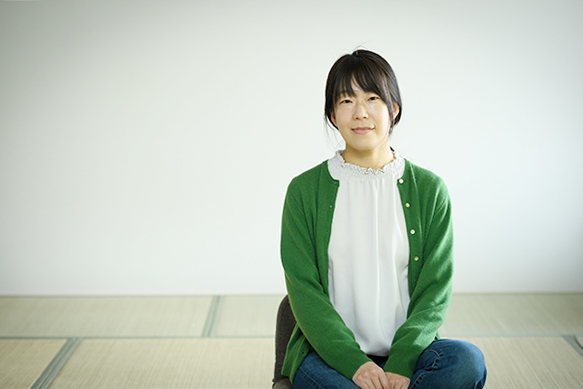
Actually, I was looking for a job and included research institutes as candidates, but since I enjoy working with students, I was more attracted to universities and graduate schools than research institutes. My experience working with undergraduates at the University of Washington made me realize that a university education is full of potential to produce people who are better than I am. As a means of contributing to science, it is natural to produce one's own research results, but we must not forget that producing the next generation of outstanding scientists is also a factor. In this sense, the Graduate School is very attractive, and this was one of the motivations for me to choose this place. For now, my goal is to complete the work I am currently working on, and to keep the Endo Lab, which just started in 2018, running and contributing in some way.
The topic I am currently working on is the mechanism by which plants bloom according to seasonal changes. The environment around plants changes drastically with the seasons, but plants adapt well to these environmental changes and bloom at the best time. It would be quite refreshing if we could successfully explain the mechanism of such a clever survival strategy of plants. Like the science textbooks used in elementary and junior high schools, I am happy when I can explain familiar events in a rational way that somehow makes sense to me. I would be even happier if I could communicate and share it with others. This is the driving force behind my research. But most of the time it doesn't work. That is why I want to continue to do experiments at the bench, to know the results first, and to stay in the field.
Daily schedule
I live in the staff dormitory, but I am a very nocturnal person, and luckily the Endo Lab has a flexible work schedule, so I get to the lab around 10:30 in the morning. I work until midnight if I have something to do while eating. I can hardly work at home. Endo Sensei, on the other hand, is extremely early and has to pick up his children from daycare in the evening, so he says, "I'll take care of the rest. Whenever Endo Sensei has something to do, he comes to the office earlier and earlier. He becomes more and more of a morning person. Then he meets me, who is a night owl, once in a while (laughs). (laughs). Aren't you early? (laughs).
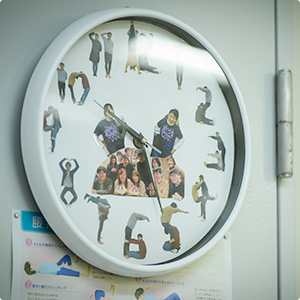
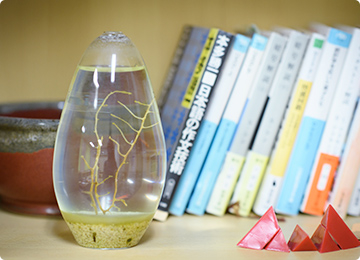
I come in and out of the office on weekends. I think if you work all the time, your efficiency will decrease. Since I'm currently covid-19 and can't go anywhere, I spend my time sleeping in, gardening, and watching foreign dramas. Recently, I have been going hiking. I went hiking in the Yada Hills, or on a trail that goes from Mt. Ikoma to Shijonawate and Kisai City. This area is rich in nature, and it is very pleasant to walk around.
Research Environment and Challenges at NAIST
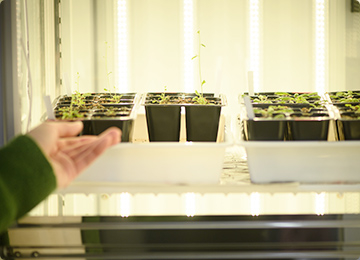
I really like the research environment at this university. The barriers between labs are very low, and especially in the botanical field, I can go to the assistant professor network if I have problems, and it is easy to borrow machines. It is also nice that there is a wide range of shared equipment. I like it because there are no ties, and there is no tendency to say, "What about Professor 〇〇's lab?
The problem is that all communication within the university is email-based, so information is buried. Like the Equal Opportunity Office, it is difficult to find information about events. I think it would be better if the website was designed to be easy to find.
I think the Equality Office website is very solid. I can go there to get the information I want, but I think it needs to be linked to the university's homepage. It is true that the banners are there, but it is difficult to see what each initiative is doing and it is difficult to find out what event is going on today. The information on seminars and results reports is all mixed up, and on top of that, I get emails telling me when the deadlines are for Grants-in-Aid for Scientific Research and private grants. Instead of burying information where it cannot be found unless you know the system itself, it would be good if we could find a method of notification other than e-mail.
I also read the article of the interview on "Each Way of Working" on the website of the Office of Equal Opportunity. I also learned from the article that there is a system to subsidize the cost of hiring graduate assistants and outsourcing their services, so it would be a waste to bury information about this kind of system. It is important to let people inside the university know about these programs, but it is also important to let people outside the university know about them. I think it is a good idea to publicize the fact that such support is available to students.
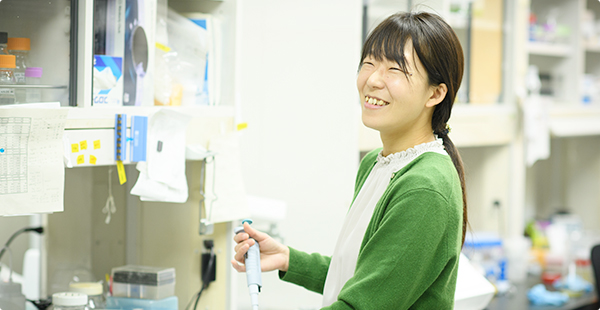
(January 2021)

-
2021.3 updated
Division of Materials Science
-
2020.3 updated
Division of Materials Science
-
2020.3 updated
Division of Materials Science






